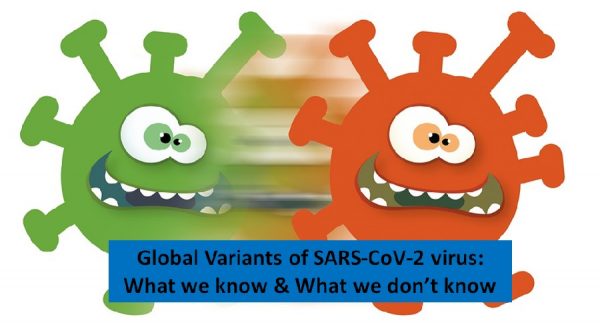
Covid-19 Virus Variants What We know and Don’t Know So Far
As the Covid-19 pandemic is continuing, globally new variants of the viruses are appearing. Scientists are working to understand why and how these variants are appearing and spreading everywhere. In addition, they are also looking at whether the new vaccines will protect people against these variants too.
How the variants occur in viruses? Mutation is a process that changes the genetic code of living beings. A change in genetic code of virus naturally occurs overtime when a living being is infected. In SARS-CoV-2 virus too these variations are happening due to such mutations causing differentiation from its wild-type virus.
Multiple variants of Covid-19 viruses are reported globally and new restrictions, lockdowns are imposed in many countries to stop the spread of variants. Scientists are working to understand the genetic differences between these virus variants and how closely are related. In United kingdom B.1.1.7, Japan & Brazil P.1 and South Africa B.1.351 – three variants are reported in last month and now their presence also detected globally. To prevent spreading of these variants we all have to continue doing our part by following the proper hygiene technique and taking safety precautions – Healthy Life.
CDC -Center for Disease Control has following information regarding these variants.
Viruses constantly change through mutation, and new variants of a virus are expected to occur over time. Sometimes new variants emerge and disappear. Other times, new variants emerge and persist. Multiple variants of the virus that causes COVID-19 have been documented in the United States and globally during this pandemic.
The virus that causes COVID-19 is a type of coronavirus, a large family of viruses. Coronaviruses are named for the crown-like spikes on their surfaces. Scientists monitor changes in the virus, including changes to the spikes on the surface of the virus. These studies, including genetic analyses of the virus, are helping scientists understand how changes to the virus might affect how it spreads and what happens to people who are infected with it.
Multiple variants of the virus that causes COVID-19 are circulating globally:
The United Kingdom (UK) identified a variant called B.1.1.7 with a large number of mutations in the fall of 2020. This variant spreads more easily and quickly than other variants. In January 2021, experts in the UK reported that this variant may be associated with an increased risk of death compared to other variant viruses, but more studies are needed to confirm this finding. It has since been detected in many countries around the world. This variant was first detected in the US at the end of December 2020.
In South Africa, another variant called B.1.351 emerged independently of B.1.1.7. Originally detected in early October 2020, B.1.351 shares some mutations with B.1.1.7. Cases caused by this variant have been reported in the US at the end of January 2021.
In Brazil, a variant called P.1 emerged that was first identified in travelers from Brazil, who were tested during routine screening at an airport in Japan, in early January. This variant contains a set of additional mutations that may affect its ability to be recognized by antibodies. This variant was first detected in the US at the end of January 2021.
These variants seem to spread more easily and quickly than other variants, which may lead to more cases of COVID-19. An increase in the number of cases will put more strain on health care resources, lead to more hospitalizations, and potentially more deaths.
So far, studies suggest that antibodies generated through vaccination with currently authorized vaccines recognize these variants. This is being closely investigated and more studies are underway.
Rigorous and increased compliance with public health mitigation strategies, such as vaccination, physical distancing, use of masks, hand hygiene, and isolation and quarantine, is essential to limit the spread of the virus that causes COVID-19 and protect public health.
What we do not know
Scientists are working to learn more about these variants, and more studies are needed to understand:
- How widely these new variants have spread
- How the disease caused by these new variants differs from the disease caused by other variants that are currently circulating
- How these variants may affect existing therapies, vaccines, and tests
What it means
Public health officials are studying these variants quickly to learn more to control their spread. They want to understand whether the variants:
- Spread more easily from person-to-person
- Cause milder or more severe disease in people
- Are detected by currently available viral tests
- Respond to medicines currently being used to treat people for COVID-19
- Change the effectiveness of COVID-19 vaccines
How to stop the spread and what precautions one must take to prevent the variants spread? Follow same hygiene practice and safety instructions like wearing facial mask, face shield, using hand sanitizer, washing hands, not touching face, nose, or eyes. Click here for more hygiene tips.
For more Covid-19 variants information please visit:
https://www.cdc.gov/coronavirus/2019-ncov
Image credit: Image by Alexandra_Koch from Pixabay (Free for commercial use)
Author: HealthyLife | Posted on: March 2, 2021
« CDC What to Expect after Getting a COVID-19 Vaccine What can fully vaccinated people can do? Find out »






















Write a comment